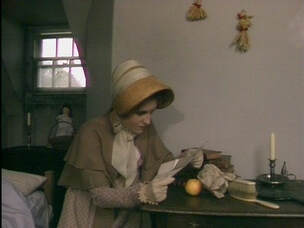| Clutching My Pearls is my ongoing blog series about my take on Jane Austen’s beliefs and ideas, as based on her novels. Folks today who love Jane Austen are eager to find ways to acquit her of being a woman of the long 18th century. Further, for some people, reinventing Jane Austen appears to be part of a larger effort to jettison and disavow the past. Click here for the first in the series. |
 Sylvestra Le Touzel as Fanny Price, 1983
Sylvestra Le Touzel as Fanny Price, 1983 In long 18th century prose, however, we more typically find the terms “barbarous” and “savage” used to condemn poor behaviour, and this is how Austen uses these words.
In Sense & Sensibility, Marianne thinks a “barbarous” rival has damaged her reputation with Willoughby. Willoughby’s farewell letter to her was “barbarously insolent.” And when she learns her sister Elinor’s secret, she condemns herself. “How barbarous have I been to you!” The term is used light-heartedly in Pride & Prejudice, when the newly-engaged Bingley spends all his time with Jane Bennet “unless when some barbarous neighbour, who could not be enough detested, had given him an invitation to dinner which he thought himself obliged to accept."
Catherine Morland suspects General Tilney of murdering his wife, a “barbarous proceeding.” Henry Tilney refers specifically to the laws, manners and customs of England to criticize the wildness of her suppositions. “Remember that we are English, that we are Christians.”
The most explicit reference to barbarism occurs in Mansfield Park. When Fanny Price learns that her newly-married cousin Maria has run away with Henry Crawford, she is stupefied. She sees it as “too horrible a confusion of guilt, too gross a complication of evil, for human nature, not in a state of utter barbarism.” ...

Since no-one was proposing that colonists should vacate the premises forthwith and return the conquered territory to the original inhabitants, it began more and more to appear that the best solution for the problem of the conflict between the Old World and the New was to assimilate, civilize and Christianize the aboriginals. Spreading Christianity and education was also an integral part of the debate around what would happen to enslaved people once they were freed.
William Wilberforce, the great abolitionist, also supported the cause of spreading the gospel through India and Africa. Not everyone agreed, but it was a widely popular cause and it went hand-in-hand with the abolition movement.
| The abolition movement in the United Kingdom and later in the United States was driven by dissenting Protestants, such as the Quakers. Supporters of abolition could be found among conventional Anglicans, but it was the Evangelicals who made slavery morally indefensible, shifting public opinion in favour of ending the slave trade. I believe Austen was in favour of abolition because she greatly admired the abolitionist Thomas Clarkson. I also think she was a traditional Church of England churchwoman. She donated to the Society for Promoting Christian Knowledge, which was sponsored by the Church of England. The SPCK's chief focus was providing religious education within the United Kingdom and later, the British Empire. It produced pamphlets to distribute to "farmers, prisoners, soldiers, seamen, servants and slave-owners." But SPCK had an evangelical rival, the Bible Society. In the excerpt to the right, an aunt urges her niece, who works as a servant, to donate a shilling from her meagre wages to the Bible Society. |
 My brother Mark and I engaging in cultural appropriation in South Korea in the late 1950's
My brother Mark and I engaging in cultural appropriation in South Korea in the late 1950's Scholars like to refer to the letter from Austen in which she declared she was "in love" with Thomas Clarkson, author of a book against the slave trade. But she also was "in love" with Claudius Buchanan, author of Christian Researches in Asia in 1811.
The purpose of this book was to promote evangelicalism in India and China (Asia, that is), making converts and eradicating paganism and old superstitions. Buchanan abhorred the practice of suttee, immolating widows on their husband's funeral pyres, but under the heading of superstitions to be combated, he included Catholics. He wanted Anglican missionaries to get out there and teach the True Faith and the bible before those pesky Catholics could make inroads in these fertile fields for conversion. And Austen was "in love" with him. This does, ahem, suggest that she agreed with his views.
In defense of missionaries, I'd like to briefly add that from the beginning, missionary work was about more than saving souls. Missionaries built schools and hospitals. My parents served as Methodist missionaries for five years in Korea, after the Korean War. My father taught library science and my mother taught English and took care of war orphans.
 Jonny Lee Miller as Edmund Bertram, 1999
Jonny Lee Miller as Edmund Bertram, 1999 Mary Crawford figures in a novel in which, as Miss Prism says, "The good ended happily, and the bad unhappily." So are we supposed to share Mary Crawford's disdain for dissenters and missionaries?
Previous post: The Noble Savage Next post: Civilis and Civility
| In A Marriage of Attachment, the second book in my Mansfield Trilogy, William Price helps rescue Africans from slaving ships as part of the British Navy's West African Squadron. Click here for more about my books. |


 RSS Feed
RSS Feed